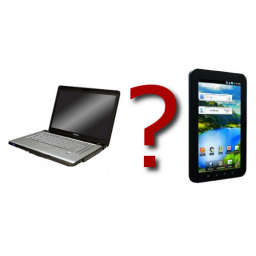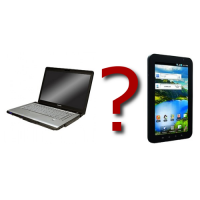Since the release of the Apple iPad in 2010, growth in this new consumer electronics market has been phenomenal. A number of market research and forecasting firms are predicting the market will grow to 57 million units by 2015.
(1) JPMorgan Securities projects that the tablet market will be worth a whopping $36 billion by 2012. (2) The tablet market has seen competitors to the Apple iPad 2 emerge in recent months.

Consumers are obviously making the choice to include tablet PCs in their electronic lives. But what are the advantages and disadvantages of these devices relative to traditional laptops?
No Keyboard
The biggest obvious difference is the lack of a keyboard. A tablet PC operates exclusively by touching the screen to mimic the action of striking a key. This affords a lot more visual space to display applications such as a calendar, an email program or a real-time instant messaging service.
The downside is that some people have trouble “typing” on a virtual keyboard. This makes writing an email or an instant message difficult if not impossible.
Tablets are good for people who mostly use a computer’s mouse and not the keyboard. The user can simply “point” and “click” using the touchscreen interface.
Size And Purpose
The smaller size of a tablet is the most advantageous feature compared to a laptop. This is a reflection of the different purpose a tablet has relative to a laptop.
Tablets are good for consuming information and media. Laptops are best used for producing information and media. Writing a document, composing an email, running mathematical calculations and preparing graphs and spreadsheets are all tasks better suited to a laptop.
Tablets are at their best when used to read news websites and blogs, reading digital magazines and looking at photos.
The size of the laptop is used to store extra memory, battery life and processing power. Tablets do not have to be recharged as much as laptops, but they trade work abilities for their small size.
This is a disadvantage for consumers who travel and need to work while doing so. Social media enthusiasts are thrilled about the ability to stay connected to the Internet and Facebook at all times.
Despite the varied uses of these devices, the distinction is clear: Customers who use computers for work are more suited to laptops.
Play
Tablets do not handle video games as well as laptops and desktops. They simply do not have the memory or processing power to handle the complex graphics and other aspects of modern video games.
Casual and hardcore gamers would be better served in choosing a laptop instead of a tablet.
Conclusion
Most consumers use tablets to read e-books and surf the Internet. Tablets may turn out to be another transitory technology that will be superseded by yet another product in the future.
Until then, they will continue to be popular with customers who are attracted by the promise of constantly staying connected.
